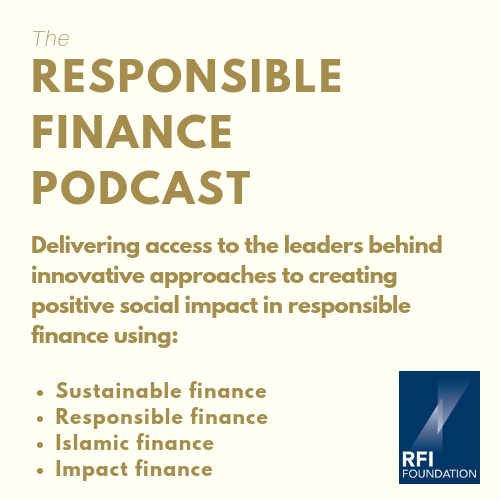Episodes
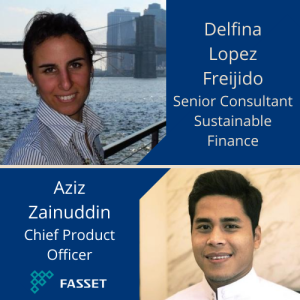
Wednesday Sep 02, 2020
Wednesday Sep 02, 2020
- The Sustainable Development Goals and Paris Agreement rely on the world making $6 trillion in infrastructure investment every year, funds which are difficult to channel into infrastructure
- High investment sizes, illiquid markets and a complex web of contracts limit infrastructure investment to only the largest institutional investors
- Fasset has launched a blockchain powered platform to increase liquidity and expand the investor base for infrastructure by digitizing real assets
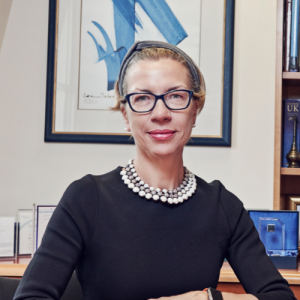
Wednesday May 27, 2020
RFI Foundation and DDCAP Group™ release a “SME market influencer” case study and podcast
Wednesday May 27, 2020
Wednesday May 27, 2020
RFI Foundation and DDCAP Group™ are excited to jointly announce the release of a case study and podcast showing how DDCAP’s experience demonstrates how SMEs can influence others to adopt responsible finance. Despite lacking the scale of the financial institutions with whom they work, SMEs in responsible finance can leverage their agility as an advantage and benefit from adopting sustainable and responsible practices more quickly than other institutions.
For DDCAP Group™, these actions have deep roots in the history of the company but have become gradually more formalized across its governance structure. Some of the impetus has come through their membership in the RFI Foundation and to fulfill the commitments they have made as a signatory to the Principles for Responsible Investment (PRI) and as an endorser of the Principles for Responsible Banking.
One of the DDCAP’s key strengths is their integration of Sustainable and Responsible Actions (SRA) into their day-to-day business operations. With their example, they offer a roadmap for other SMEs wishing to follow in translating principles into practice. The roadmap outlines how SMEs can start small with top-down initiatives that gain buy-in across key stakeholders in leadership positions.
SMEs that build leadership commitment to responsible finance can open up their efforts to encourage bottom up initiatives and create a more rigorous governance structure review existing and develop new initiatives. Through this process, SMEs can readily embed SRAs across the company to support the creation of a strong culture around common values to create new competitive advantage.
Blake Goud, CEO of the RFI Foundation, commented: “By following the leadership of the amazing examples of leadership in responsible finance across RFI’s network of members, we hope to catalyze activities that support an equitable, inclusive and sustainable economy. All of those who aspire to embody the shared values of responsible finance can establish themselves as market leaders by adopting responsible finance best practices as embodied by the actions of our members.”
Stella Cox CBE, Managing Director of DDCAP Group™, added: “We see a clear need amongst financial services sector SMEs to identify an efficient route to the embodiment of sustainable and responsible practice in their culture, business and operations. Through the release of this case study and podcast, we hope that other SMEs will use the roadmap we have found to develop their own unique approach.”
The case study is available from the RFI Foundation website at www.rfi-foundation.org and the DDCAP Group™ website at www.ddcap.co.uk. The podcast is released as an episode of the “Responsible Finance Podcast” series available on iTunes, GooglePlay, Stitcher and Podbean.
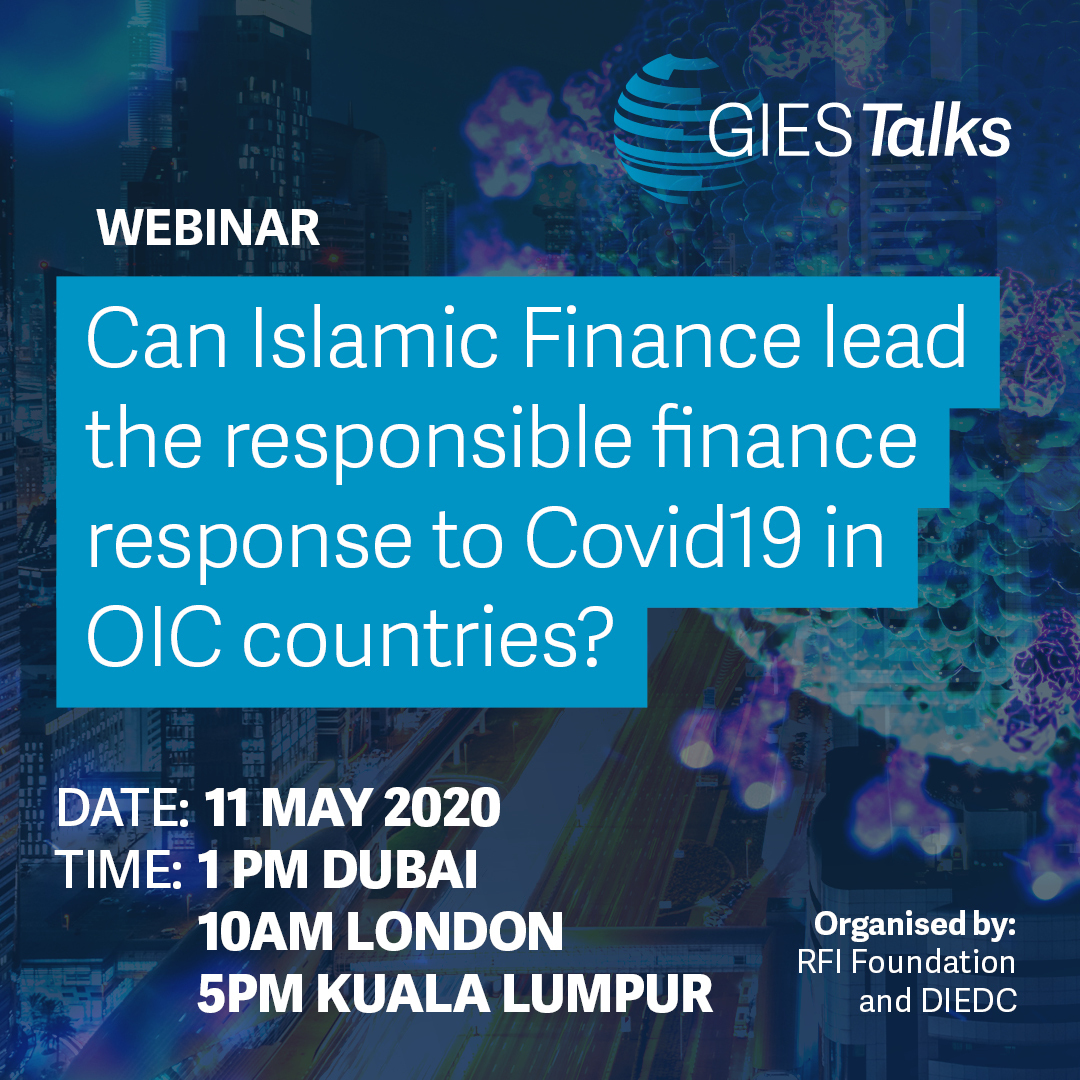
Wednesday May 13, 2020
Can Islamic finance lead the responsible finance response to Covid19 in OIC countries?
Wednesday May 13, 2020
Wednesday May 13, 2020
This session, a replay of a webinar released on 11 May 2020 organized by RFI Foundation and Dubai Islamic Economy Development Centre (DIEDC), looks at the role for Islamic finance in the Covid-19 response.
Speakers:
- Blake Goud, CEO, RFI Foundation (Moderator)
- Abdulla Al Awar, CEO, DIEDC
- Ramya Gopalan, Global Innovation Coordinator and Alternative Financing Lead, IFRC
- Rafe Haneef, Chief Executive Officer, Group Transaction Banking, CIMB
- Khaled Al Aboodi, Managing Partner, Sustainable Finance Solutions
Discussion questions:
- What is the scope of the challenge from Covid-19 for OIC countries? Is the impact of Covid-19 different than Western countries? What are the major points of need that financial institutions can address?
- What challenges do Islamic financial institutions face looking beyond the immediate Covid shock in OIC markets, especially in relation to expanding their focus on Maqasid/SDG/ESG related issues?
- What existing needs within OIC countries has Covid-19 highlighted, and how can Islamic and responsible finance provide a unique solution?
Key conclusions:
- The response to Covid will come in two phases: crisis response and rebuilding
- Islamic finance does not come equipped with the same intrinsic features that insulate it the way it did in the Great Financial Crisis, and it has to focus on its core ethical values to distinguish itself post-crisis
- Growth of responsible finance has helped change investors' expectations to find a better balance between economic and social impact, and Islamic finance can benefit by focusing more efforts on social impact
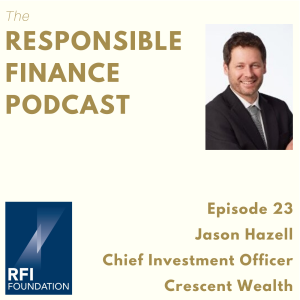
Tuesday Apr 07, 2020
Tuesday Apr 07, 2020
- Shariah screens limit the number of defensive assets available for asset managers in narrow markets where financial institutions represent 25-30% of the market
- Investment managers can offset some of the additional risk by using ESG integration strategies, as well as investing in global sukuk
- The institutionalization of Shari'ah standards gives Islamic asset managers a leg up compared to ESG in terms of clarity about how their investment process is affected by their approach to responsible finance
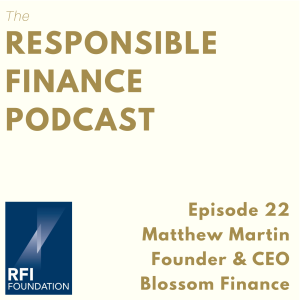
Tuesday Oct 29, 2019
Small is beautiful for the world’s tiniest sukuk
Tuesday Oct 29, 2019
Tuesday Oct 29, 2019
This month, we are featuring an update to our podcast with Matthew Martin, Founder & CEO of Blossom Finance that we released in June of last year. In this update podcast, Matthew gives us an update on Blossom Finance, which have recently closed the world’s first microsukuk.
Blossom's sukuk is notable for a number of reasons, including its proof-of-concept size of IDR 702 million ($50,000) and its use of blockchain to manage the KYC, issuance, periodic payments, trading and redemption. It also uses a mudaraba structure that replaces a fixed coupon with a periodic payments that pass-through the investor's share of profits on a monthly basis during its one-year tenor. The funds raised in the sukuk will fund business microfinancing for MSMEs by BMT Bina Ummah, an Islamic microfinance institution in Yogyakarta.
You can find out more about Blossom Finance at www.blossomfinance.com.
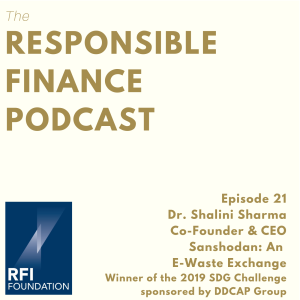
Thursday Sep 26, 2019
Interview with Dr. Shalini Sharma
Thursday Sep 26, 2019
Thursday Sep 26, 2019
This episode of the RFI podcast features an interview with Dr. Shalini Sharma, Co-Founder and CEO of Sanshodhan: An E-Waste Exchange, the winner of the 2019 Support Disruption for Good Challenge sponsored by DDCAP Group. Dr. Shalini accepted the award and presented Sanshodhan to the audience of responsible finance leaders in April 2019 at the RFI Summit at Abu Dhabi Global Markets. In the podcast, she introduces Sanshodhan and provides an update on their progress since the last time we heard from her in April.
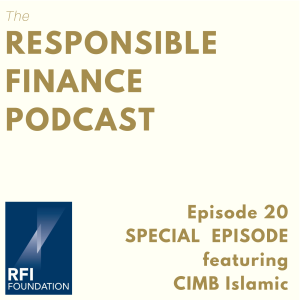
Wednesday Jun 19, 2019
Responsible Finance Champions: CIMB Islamic Bank's responsible finance journey
Wednesday Jun 19, 2019
Wednesday Jun 19, 2019
The RFI Foundation is excited to announce the release of an in-depth case study of one of our member financial institutions, CIMB Islamic Bank (“CIMB Islamic”), which has adopted responsible finance practices in a systematic way. The case study and this companion podcast are designed to show that it is possible for an Islamic bank to integrate responsible finance practices into its operations and strategy and to generate wide stakeholder buy-in based on a fundamental business rationale.
The case study and podcast expand a shorter case study that was included in the Refinitiv-RFI Foundation report titled “Islamic Finance ESG Outlook 2019”, which was released during the RFI Summit 2019. The report, which also includes knowledge-building materials created by RFI Foundation in collaboration with Refinitiv, focused on the financial materiality of responsible finance for Islamic financial institutions. Taken together, the case study, podcast and report demonstrate there is a defensible, clear business case for Islamic banks to seek out strategic advantage in responsible finance.
CIMB Islamic, and the whole CIMB Group, have shown through their actions that there is a repeatable process for Islamic banks to adopt responsible finance practices. Focused on CIMB Islamic, this podcast documents how CIMB Group achieved buy-in from a diverse range of internal and external stakeholders, including management, shareholders and directors, with the support of employees who are passionate about sustainability, particularly millennials.

Tuesday Mar 19, 2019
Tuesday Mar 19, 2019
This month, we are featuring an interview with Stella Cox CBE, Managing Director of DDCAP Group. As you’ll hear, she has been involved with the Islamic finance industry for many years and has been a consistent champion for Islamic finance, responsible finance and women in the financial sector.
Ms. Cox was a member of the UK Government’s Task Force on Islamic Finance that advised the government on its debut sukuk issuance, one of the first from a non-Muslim majority country sovereign issuer. Her other contributions to the development of Islamic finance are too numerous to mention in full here, but we’ll cover a few of her most important contributions to Islamic finance in our interview.
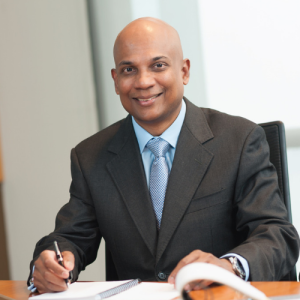
Tuesday Feb 19, 2019
Tuesday Feb 19, 2019
When the Principles for Responsible Investment (PRI) launched their Credit Rating Initiative, one of the six founding members was RAM Ratings, after interacting with WWF and Saturna Capital on sustainable finance and understanding how a credit rating agency could drive change. RAM Ratings was the first domestic credit rating agency in Malaysia when it was set up in 1990. In the time since, as Malaysia has developed Islamic capital markets, RAM has rated many of the sukuk issued as Malaysia’s sukuk market became the most liquid in the world.
RAM extended its innovation in Islamic finance to sustainable finance through RAM Consultancy, a provider of sustainability services and ESG analytics that plays a vital role as an industry catalyst for both. RAM Consultancy CEO Promod Dass, who was previously Deputy CEO for RAM Ratings, linked the evolution from Islamic finance to responsible finance. Speaking with the RFI podcast, he said: “It was natural for us to envisage the strong linkages or shared values between the ethical/responsible finance elements in Islamic finance as well as sustainability and ESG.”
Listen to the rest of the podcast to learn more about how ESG factors are becoming systematically and transparently integrated into credit rating methodologies, and how Islamic finance, sustainability and ESG intersect and complement one another in understanding and measuring investment and financing risks.
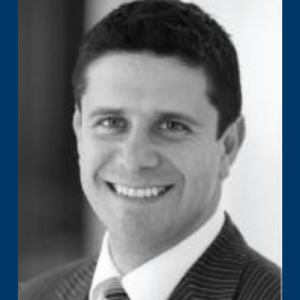
Wednesday Jan 23, 2019
Wednesday Jan 23, 2019
This month, we are featuring an interview with Talal Yassine, OAM, Managing Director of Crescent Wealth, who is also a member of the RFI Foundation Board of Trustees.
In addition to his work at Crescent Wealth, he’s active across a range of organizations in Australia. Talal is an Adjunct Professor within the Business School, Western Sydney University he is Chairman of Quay Capital, the Australian Arab Dialogue Limited, and as the Patron of the Crescent Institute Ltd. He also serves on the Board of the Whitlam Institute Ltd.
Talal has previously served on the Board of Australia Post, Sydney Ports, Macquarie University and as the Chairman of the Australian Department of Foreign Affairs & Trade, Council of Australian Arab Relations.

